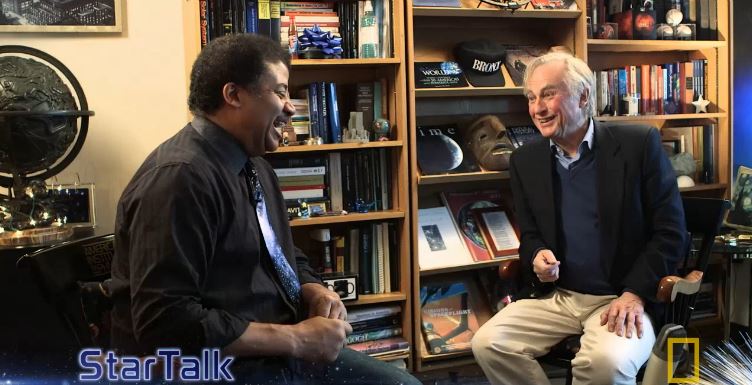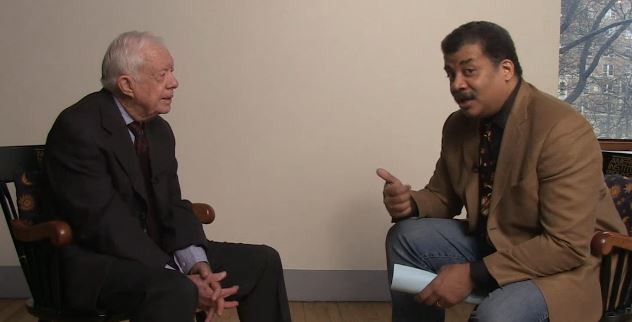StarTalkTV: Can Science and Religion Co-Exist
 StarTalk TV goes to either the end of everything or the beginning of nothing, depending on your perspective.
StarTalk TV goes to either the end of everything or the beginning of nothing, depending on your perspective.
This episode was a natural follow to the Arianna Huffington episode in which she talked of the intersection of science and religion. Host Neil deGrasse Tyson seemed skeptical of her claim about a connection between religion and science. This episode featuring evolutionary biologist Richard Dawkins fully explored that divide.
Taking this trip to the collision of science and religion with him back at the Hall of the Universe were his guests, comic Eugene Mirman and Jesuit priest, Father James Martin (Full disclosure: I went to a Jesuit university and thought they did a good job of not messing me up).
So, where do science and religion converge and can they co-exist? Here’s some of the highlights from the episode.
Jesuits are keeping the world on track: Introducing Father Martin Dr. Tyson reminds us that they were behind the prosecution of Galileo for placing the sun at the center of the universe, but then also reminds us that the Jesuits also used science to create the Gregorian calendar, which actually keeps us from having years that are either too short or too long, as previous calendars did.
Logic might not always keep you from getting eaten: Talking to professor Dawkins in his office, the conversation contrasts religion and logic. Logical thinking didn’t always work out for ancestors, Dawkins explains since though it might be logical for survival, it wouldn’t have served man well to study a lion’s teeth the first time you encounter it.
Bouncers are the intersection of science and religion: Discussing whether science and religion are compatible, Tyson refers to Pope Francis, who, besides being the head of the Roman Catholic Church, also has a degree in chemistry and once served as a bouncer in Argentina. Clearly, if you’re in a bar fight about the periodic table, the pope’s your man.
Faith by degrees: Tyson asks how someone like the Pope can hold a scientific degree and believe in the spiritual realm. This is pretty much the crux of the rest of this episode. Martin responds that the searching for answers in science works as it’s a way of coming understanding God’s creation.
Tyson describes having a moment of looking down from a mountain on a night in which he could look down on clouds covering cities and feeling that it was spiritual, but not requiring a deity. Mirman remarks that, “You’re describing Zeus’ experience.”
Rules and regulations: Tyson says one of the major stumbling blocks for him isn’t finding the spirituality in nature, but the whole package of beliefs that come along with any religion. There’s a long discussion of rules, with Tyson explaining that science’s rules can be broken if they lead to greater truth.
Beliefs versus abilities: Back at the office Tyson and Dawkins explore whether belief in non-logical things should exclude someone from say, practicing medicine. Hey where’s Ben Carson when you need him?
Martin disagrees with the thought that such people could exist. Those who would hold such thoughts wouldn’t be scientists. Tyson challenges this, saying that he’s met scientists who disavow evolution.
Mysteries of deity: Martin says that certain parts of the sciences, such as quantum mechanics eventually lead to point where you have to accept something is happening, without an explanation. Tyson agrees that mysteries exist but challenges the notion that a deity is needed to cover the gap between science and mystery.
Science believers: When it comes to scientists that express belief in God, Dawkins explains that that pre-Darwin really had no choice. Those who came after Darwin frequently don’t believe all the tenents of religion or, as in Albert Einstein’s case, were expressing a belief in the divine as a metaphor for how the universe works. That leaves a small percentage that practice science and believe fully, of those, Dawkins says he just doesn’t understand them.
Martin says he too doesn’t understand how one can doubt evolution and, but that science doesn’t require abandoning one’s religious beliefs.
Bias battles: Perhaps the most contentious portion of the episode was when Dawkins described bias against atheists, pointing out that in the U.S. there’s no real use for atheist politicians. He also describes the difficulties for some young people expressing atheist beliefs in their communities and compares it to the experience of gay youths coming out of the closet.
Martin accepts this but warns against a bias he sees coming from the atheist community towards religious people who are considered “idiots” for believing.
Tyson points out however, that since atheists don’t run anything they don’t have the power to discriminate.
Finally the show closes with this enlightening bit of conversation after a short discussion of the idea of what God’s existence and proof would mean to science, with Dawkins, Martin adds that a deity at the beginning of the universe is the cause in scientific cause and effect. Tyson shoots back and quotes himself saying, “The universe is under no obligation to make sense to us.” Martin responds with a quick, “Neither is God.







